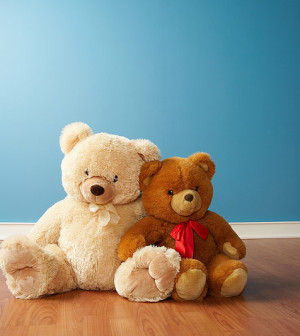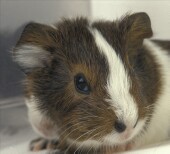- 8 Ways to Increase Dopamine Naturally
- 7 Best Breads for Maintaining Stable Blood Sugar
- Gelatin vs. Collagen: Which is Best for Skin, Nails, and Joints?
- The Long-Term Effects of Daily Turmeric Supplements on Liver Health
- Could Your Grocery Store Meat Be Causing Recurring UTIs?
- Are You Making This Expensive Thermostat Error This Winter?
- Recognizing the Signs of Hypothyroidism
- 10 Strategies to Overcome Insomnia
- Could Artificial Sweeteners Be Aging the Brain Faster?
- Techniques for Soothing Your Nervous System
Animals May Ease Social Anxiety in Children With Autism


Being around animals may help reduce social anxiety in children with autism, new research suggests.
The findings could lead to new treatment approaches that use pets such as dogs, cats and guinea pigs to help children with autism improve their social skills and interactions with other people, the researchers said.
The study included 38 children with autism and 76 children without the disorder. All of the children wore special wrist devices designed to detect anxiety and other responses to social situations.
The children first read a book by themselves. Then, they read a book to two other children and then had 10 minutes of group play. After that, the children were given 10 minutes of supervised play with guinea pigs. Researchers chose guinea pigs because of their small size and gentle nature.
Compared to other children, those with autism had higher levels of anxiety when reading silently, reading aloud and during group play. However, the youngsters with autism had a significant drop in anxiety levels during the session with the guinea pig.
This could be because pets offer unqualified acceptance and make children with autism feel more secure, according to Marguerite O’Haire, from the Center for the Human-Animal Bond in the College of Veterinary Medicine at Purdue University in West Lafayette, Ind., and colleagues.
The study was published online recently in the journal Developmental Psychobiology. The research was partly funded by the U.S. National Institute of Child Health and Human Development.
“Previous studies suggest that in the presence of companion animals, children with autism spectrum disorders function better socially,” James Griffin, of the NICHD’s Child Development and Behavior Branch, said in an agency news release. “This study provides physiological evidence that the proximity of animals eases the stress that children with autism may experience in social situations.”
However, the findings do not mean that parents of children with autism should get a pet for their children, O’Haire said. Further research is needed to learn how animals might be used in programs to help children with autism develop social skills, she said.
More information
The U.S. National Institute of Neurological Disorders and Stroke has more about autism.
Source: HealthDay
Copyright © 2026 HealthDay. All rights reserved.










